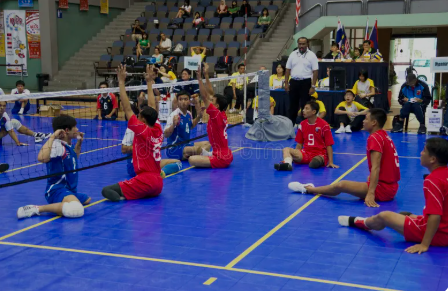Volleyball for People with Disabilities: Breaking Barriers and Building Community
Volleyball is a sport that brings people together, fostering teamwork, coordination, and physical fitness. For people with disabilities, adapted versions of volleyball have provided a platform to showcase athleticism, boost self-esteem, and create inclusive communities. Adaptive volleyball for people with disabilities is not just about competition; it’s about empowerment, camaraderie, and demonstrating that physical limitations don’t limit one’s ability to succeed and thrive in sport.
1. Sitting Volleyball: A Sport for All Abilities
One of the most popular forms of volleyball for athletes with disabilities is sitting volleyball. Developed for athletes with physical disabilities, sitting volleyball follows the same basic principles as regular volleyball, but with a few key modifications. Instead of standing, players are seated on the floor, and they must use their upper body strength to move and spike the ball.
The sport is played on a smaller court, and the net is lower than in traditional volleyball to accommodate players sitting down. Sitting volleyball is played by people with a variety of disabilities, including those with spinal cord injuries, amputations, and cerebral palsy. The game focuses on upper body strength, agility, and strategy, and because it is played on a smaller court, it demands quick reflexes and precise movement.
2. The Paralympic Movement and Sitting Volleyball
Sitting volleyball is part of the Paralympic Games and has been featured in every Summer Paralympic Games since 1980 for men and 2004 for women. The inclusion of sitting volleyball in the Paralympics has provided an international platform for athletes with disabilities to showcase their talents and achieve recognition at the highest level of competition.
The sport has grown tremendously over the years, with national and international tournaments, including the Paralympic Games, the World ParaVolley Championship, and regional competitions across the globe. These events allow athletes to compete at an elite level, proving that with determination and skill, disability can be overcome on the court.
3. Benefits of Volleyball for People with Disabilities
Adaptive volleyball, like sitting volleyball, offers a wide range of benefits for athletes with disabilities:
- Physical Fitness: Playing volleyball improves cardiovascular health, builds muscle strength, and enhances flexibility. For athletes with disabilities, these benefits are even more crucial as they often face additional health challenges that may limit their mobility and stamina.
- Mental Health: Participating in team sports fosters a sense of belonging, builds confidence, and improves overall mental well-being. For individuals with disabilities, volleyball provides an opportunity to feel connected to others, gain independence, and achieve personal and athletic goals.
- Social Inclusion: Volleyball for people with disabilities helps break down barriers by promoting inclusion. It provides a platform for athletes with disabilities to interact with others, share experiences, and form lasting friendships both on and off the court.
- Skill Development: Volleyball helps improve hand-eye coordination, reflexes, teamwork, and communication. These skills are transferable to other areas of life and empower athletes with disabilities to become more independent in their daily routines.
4. Technological Advances and Equipment for Adaptive Volleyball
Over the years, advances in adaptive equipment have also played a vital role in the evolution of volleyball for people with disabilities. For example, athletes who require prosthetics or use wheelchairs in sports can now access specialized equipment designed to enhance performance. For sitting volleyball, athletes are encouraged to use specialized sports chairs that offer better stability and mobility, allowing for optimal movement on the court.
In addition, modified volleyballs with different textures or weights have been designed to accommodate athletes with various disabilities, ensuring that the ball is easy to handle and control.
5. Inspiring Athletes and Role Models
There are many inspiring athletes in the world of adaptive volleyball who serve as role models for individuals with disabilities. The U.S. Sitting Volleyball Women’s Team, for example, has earned multiple medals in the Paralympics and is widely recognized as one of the top teams in the world. These athletes exemplify the power of resilience, teamwork, and skill in overcoming physical challenges.
Other athletes, such as Renee O’Connor from the U.S. Women’s Sitting Volleyball team, have shared their journeys of overcoming injury, loss, and adversity to compete at the highest level. These athletes inspire countless others with disabilities to take up the sport and push themselves beyond perceived limitations.
6. Challenges and the Future of Volleyball for People with Disabilities
While adaptive volleyball has made incredible strides, there are still challenges to overcome. The accessibility of facilities, the cost of equipment, and limited awareness of adaptive volleyball programs in some regions remain obstacles. Additionally, the media coverage of adaptive sports is often overshadowed by mainstream sports, which can limit the visibility of athletes with disabilities.
However, with growing efforts from organizations and advocacy groups, these challenges are slowly being addressed. More funding, media attention, and awareness are starting to help improve the accessibility and recognition of volleyball for people with disabilities. Grassroots programs and partnerships with schools, community organizations, and the Paralympic movement continue to build opportunities for athletes at all levels.
7. Conclusion: Empowering Through Volleyball
Volleyball for people with disabilities, especially sitting volleyball, is much more than just a sport; it’s a powerful tool for empowerment, inclusion, and personal growth. It gives athletes with disabilities a chance to compete at high levels, break physical barriers, and demonstrate their strength and skill. As adaptive volleyball continues to grow, more individuals with disabilities will find their place in the sport, while inspiring others to realize their full potential both on and off the court.
By supporting and promoting volleyball programs for people with disabilities, we not only help elevate the game but also contribute to building a more inclusive and supportive world for all athletes, regardless of their physical abilities.







